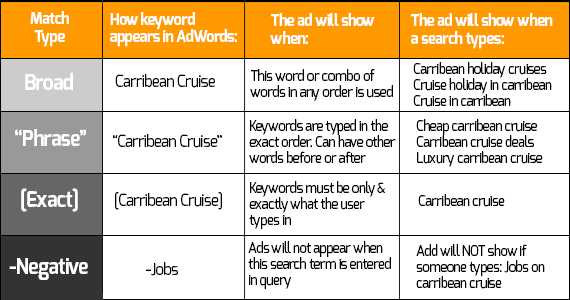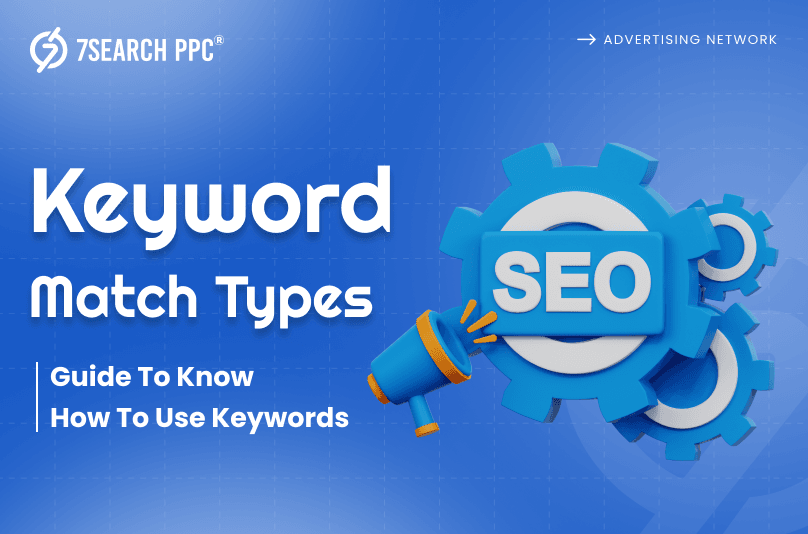Woohoo! It’s a match! No, it’s not about the Tinder dating app. It’s about the win that you get by using the right keyword to match the query of your ideal audience in your ad campaigns. Getting great results in digital advertising isn’t just about picking the right keywords—it’s also about knowing how to match those keywords with what people are searching for. Keywords are the lead player of any successful advertising campaign. They’re the words and phrases that potential customers use to search for offerings like yours. However, with so many different keyword match types available, it can be tough to know which ones to use and how to use them effectively.
When it comes to online advertising, getting your ad in front of the right people is important as it increases ROI. But the only condition is that you have to make sure that your ad shows up for the right searches. That’s where keyword match types make their importance. They let you control how closely a search has to match your chosen keywords for your ad to appear.
If you know how to use these match types, you can make sure your ads reach the right audience, increase clicks, and everything that makes your business successful. Readers, there is much more to learn about mastering keywords.
So, keep reading to expand your knowledge!
Keyword Match Types: Maze Towards Success
Did you know how many searches people perform on Google? The results might shock you. According to DemandSage, Google’s search volume is as follows:
- Every second: 99,000 searches
- Every minute: 5.94 million searches
- Every hour: 356.4 million searches
- Every day: 8.55 billion searches
Keyword match types determine how closely a keyword in your ad campaign needs to match a user’s search query for your digital ad to be shown. They help you control which searches trigger your ads, allowing you to include or exclude variations of your keywords. For example, exact match types show ads only for precise terms, while broad match types can display ads for a wider range of related searches. This helps you target the right audience, avoid irrelevant traffic, and make your digital advertising more effective.
The Benefits of Using the Right Keyword Match
As a business owner, what do we want from each ad campaign? We want every impression to lead to a click and every click to result in a conversion. This is possible when we show the right ad to an audience that is actively seeking offerings like yours by targeting and matching the right keyword. Here are some benefits of using it:
- Improved Ad Relevance: Using the right keyword match type ensures that your online ads appear for the most relevant searches. For example, exact match keywords show ads only for the exact search term, making it more likely that users who see your ad are genuinely interested in what you offer. This increased relevance can turn into higher click-through rates (CTR) and better engagement, as your ads are more likely to meet the specific wants and intentions of potential customers.
- Better Budget Management: When you use keyword match types effectively, you can control how your budget is spent. Broad-match keywords may attract a wide audience but can also waste your budget on irrelevant clicks. On the other hand, exact match or phrase match keywords are more specific. They help you use your budget better by targeting people who are more likely to make a purchase or take action. Overall, it depends on your ad objectives and business goals, but researching the perfect keyword that matches your target audience’s intent ensures more effective use of your budget.
- Explosive Lead Generation: Successful business transactions come second; the first one is to attract an ideal audience and generate leads. When a user clicks on an ad, it becomes a lead for businesses. The chances are low that users will click and take action because there are many competitors offering the same products and services at different price ranges. A perfect keyword match helps advertisers generate leads by offering their ad on a relevant search query. When they get leads, they can easily target them by pitching personalized offers that address their specific needs and interests.
- One-up On The Competition: Online ads are like magnets that attract the right audience and impress them with their offerings (if done right). Today, 65% of small to mid-sized businesses run a PPC campaign, 45% use paid search strategies, and 55% utilize display ads (Statista report). So, where you stand in this crowd can be decided by how wisely you match your keywords with your offerings. A perfect keyword match type makes sure your ads show up for the right people and helps you gain rank better than your competitors in the market.
- Audience Clarity: The right keyword match types give you clear insights into which keywords are catching the most traffic for your business. This means you can see which terms or phrases are bringing in visitors who actually click on your ads and make purchases. With this data, you can better understand your audience’s preferences and refine your targeting strategy.
4 Keyword Match Types: Match Your Keywords to Your Goals
The four keyword match types used in digital advertising are:

Broad Match
It is the default keyword match type, and it shows your ads for searches related to any part of your keyword. This type of match triggers ads even if a search query contains only one of the words in your keyword phrase. It uses factors like the user’s search history and landing page content to improve relevance. For example, a broad match for “Home loans” might trigger ads for “Home credits” or “interest rates on home loans.” This broad match helps reach a wide audience but with less precision.
Phrase Match
Phrase match shows your ads when the search query contains the meaning or intent of your keyword, offering more targeting control than broad match. The syntax requires quotes around the keyword, such as “Soccer shoes.” Suppose your keyword is “Soccer shoes,” your ads may appear for searches like:
- Shoes for soccer
- Buy soccer shoes on sale
- Limited edition soccer shoes
Exact Match
The exact match is for advertisers who want maximum control over ad targeting. Ads are shown only when the search query has the same meaning as your keyword. It reaches fewer people but ensures high relevance. The syntax for exact match uses square brackets, such as [shoes]. For example, with an exact match for [blue shoes], your ad will only be visible when someone searches for that exact phrase. This helps make sure your ad reaches the most relevant audience. If the advertiser chooses an exact keyword match type, then their ads won’t appear for similar terms like “Blue sneakers” or “Blue short heels.”
Negative Match
As an advertiser, you need to pay for every impression when you choose a digital marketing approach like SEM. You don’t want to spend a part of your budget on irrelevant searches that your business does not offer. A negative match lets you exclude specific keywords from triggering your ads.
This helps you avoid showing ads in irrelevant searches. Suppose you started your own organic, handmade soap business. You might want to target people searching for “organic soap” or “handmade soap.” However, you don’t want your ads to show up for searches like “cheap soap” or “soap making supplies.”
- Negative broad match keyword: “cheap”
- Negative phrase match keyword:“soap making supplies.”
By using a negative keyword match type, you can make sure your ads show up only for the right search terms, helping you avoid spending money on clicks from people who are not interested in what you are offering.
Which Keyword Match Type Should You Target?
No one can give you a better answer to this question than you can. The reason is that only you understand your business, the outcomes you want from your ad campaigns, and, of course, your budget. When deciding which keyword match type to target, it’s essential to consider a few factors.
First, think about your ideal customers and what they are likely to search for. Your knowledge of their needs and behaviors is crucial in selecting the right keywords. Second, data from previous campaigns should be reviewed to see which keywords performed best. This can give you insights into which match types drive the most relevant traffic.
Additionally, consider your budget. Broader match types may attract more visitors but can be costlier, while more specific match types may save money but have a smaller reach. Balancing these aspects will help you choose the most effective keyword match type for your goals.
Ultimately, the best keyword match type depends on your unique needs, customer insights, and budget constraints.
Conclusion
Mastering keyword match types is essential for optimizing your digital advertising campaigns. By understanding and effectively using broad, phrase, exact, and negative match types, you can ensure your ads reach the ideal audience and maximize your ROI. Each keyword match type offers different levels of control and reach, so choosing the right one depends on your digital advertising goals, target audience, and budget. Review your ad campaign performance on a regular basis and adjust your keyword strategies to run ahead of the rivals and achieve better results.
Frequently Asked Questions (FAQs)
What are keyword match types?
Keyword match types decide how similar a search query must be to your keyword for your ad to show up.
Why are keyword match types important?
They help you control which searches trigger your ads, allowing you to target the right audience and avoid irrelevant traffic.
How many keyword match types are there?
Broad match, phrase match, exact match, and negative match are the four main match types.
How can I avoid showing ads for irrelevant searches?
You can use negative match keywords to exclude specific terms from triggering your ads.
What is the difference between phrase match and broad match?
Phrase match requires the search query to contain the keyword in the same order as the phrase, while broad match allows for variations in the order and related terms.


















